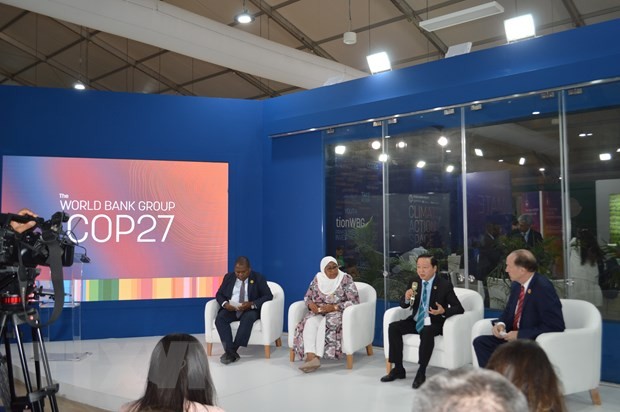(VOVWORLD) - Climate change has negatively impacted many countries. Vietnam’s long coastline makes it particularly vulnerable, and climate change has already impacted Vietnam’s Sustainable Development Goals. To implement its commitments at the 26th UN Conference on Climate Change (COP26), Vietnam is accelerating energy transition to build a clean energy economy toward sustainable development.
 Minister of Natural Resources and Environment Tran Hong Ha talks about Vietnam's solutions and roadmap to implement its commitments on climate change response. (photo: Nguyen Truong/VNA) Minister of Natural Resources and Environment Tran Hong Ha talks about Vietnam's solutions and roadmap to implement its commitments on climate change response. (photo: Nguyen Truong/VNA) |
Energy transition is the key to realizing the goal of achieving net zero emission by 2050 to which Vietnam committed at COP26 last year, said Minister of Natural Resources and Environment Tran Hong Ha at the 27th United Nations Climate Change Conference (COP27) in Egypt.
Ha emphasized that developing renewable energies must be part of ensuring energy security. He asked countries to support the transfer of advanced technologies related to wind and solar power to Vietnam to assist its energy transition.
During his visit to Vietnam in August, President of COP26 Alok Sharma discussed with Vietnamese leaders on a Just Energy Transition Partnership, a long-term agreement between Vietnam and the International Partnership Group (IPG), which includes the UK, the EU, France, Germany, Japan, and the US. This is an opportunity for Vietnam to transition away from coal and achieve net zero emissions by 2050.
At COP26 in Glasgow, Scotland, in November 2021, 47 countries, including Vietnam, supported the "Declaration of a global transition from coal to clean electricity", with a commitment to stop building new coal-thermal power plants. Under the commitment, most major economies will phase out coal power by the 2030s, while the rest will do so from the 2040s onwards.
The Vietnamese government has completed a draft National Power Development Plan for the 2021-2030 period, with a vision to 2045, which exploits domestic primary energy resources such as natural gas for electricity production and will not build new coal-thermal power plants after 2030.